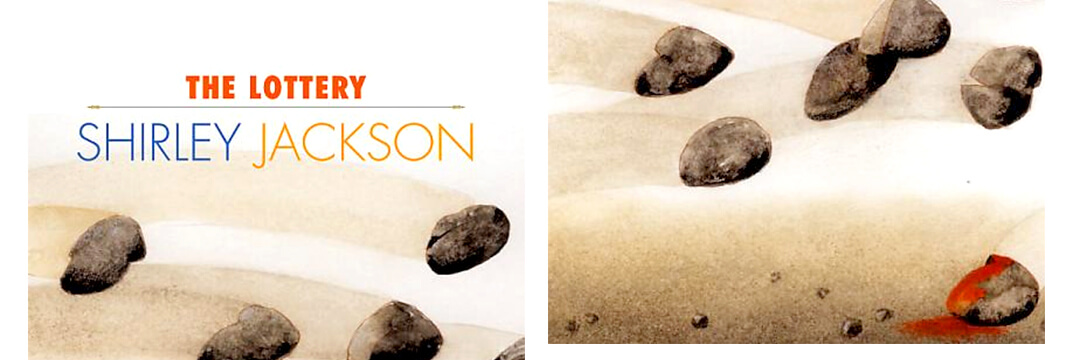
The short story “The Lottery” is a powerful mystery literary piece. The author Shirley Jackson keeps the readers glued to the story to the very end. The only way to decode the story is to read it to the last word. To create a piece that reflects society at a moment in time, Jackson utilizes the elements of the suspense genre. Thus, the story turns out to be timely even for the twenty-first century. Throughout the story, Jackson portrays the people of the village as harmonious and good-natured individuals. However, their dutiful attendance of the ritual poses questions in the minds of the readers. Why would they attend the ritual with such loyalty if they all knew the final result? Why was there a sudden change in the way they behaved toward Mrs. Hutchinson? To answer these questions, a close look at the story is necessary. It explains the behavior of the village people who unleash violence and brutality on one of their fellow villagers. “The Lottery” incorporates several literary devices such as suspense, irony, foreshadowing, and denouement, to shed light on the blind spot of society.
Jackson fills the story with suspense, to keep the readers alert trying to learn the result of the lottery. Suspense is the act of capturing the audience’s attention, and exploiting it in a piece of art makes a reader always and continually eager to learn what happens next. One way in which Jackson attains suspense in this story is by being unpredictable. Unlike other genres, a mystery genre does not entail predictability. The title of the story, which in most cases hints at the main idea of the story, in this case, does not prompt anything. The beautiful day that Jackson paints do not suggest a tragic end. Every incident that occurs during the ritual heightens the suspense rather than provides answers (Sparknotes 1).
Firstly, the gathering of stones by the boys raises questions in the minds of the readers. The audience follows closely to learn about the use of the stones in the practice. Secondly, the constant mentioning of the box as “the black box” throughout the story increases the readers’ desire to keep up with the author. At the first mention of the box, as Mr. Summers came to the square, the author could have dropped the adjective ” black” and referred to it simply as “the box” since there were no other boxes. Jackson’s decision not to drop the adjective and its persistent use keep the readers intrigued.
It is worth mentioning the episode when Mr. Summers settled the box on the stool. The author notes that the villagers maintained a reasonable space between themselves and the box. This suggests some form of avoidance or fear or possible uneasy attitude on the part of the villagers towards the box. The same is true of the episode when Joe asked for a hand, and people were hesitant (Jackson 1). The reader wonders why the people are trying to keep away from the box, and the only way to know, is to keep reading the story until the very end.
Lastly, the villagers are nervous until the end of the ritual. This nervousness suggests that something evil will fall upon them during the ritual; however, the reader cannot so far predict what will be the outcome of the ritual. Jackson fails to give explanations throughout the whole story, keeping the readers puzzled. The author presents to the readers the process of the heads of the family picking the lottery papers, without unveiling what awaits the winner of the lottery. By withholding explanation, Jackson succeeds in building suspense from beginning to end (Morgan 1).
You may find this article Tips on Writing an Effective Essay interesting
Interestingly, the author uses foreshadowing, or the projection of future events in a piece of art through events occurring early in the piece, to hint at the tragic end of the story. In the story “The Lottery”, the author foreshadows the stoning of Tessie in several ways. First, in paragraph two, the children gather a pile of stones (Cummings 5). Jackson writes: “Bobby Martin had already stuffed his pockets full of stones, and the other boys soon followed his example…made a great pile of stones in one corner…” (1). The children knew the stones were crucial for the ritual and gathered many (Sparknotes 1).
Besides, Tessie’s arrival at the verge of the ritual opening and her comment to Mr. Summers sets her aside, indicating her unfortunate fate. Tessie says: “Wouldn’t have me leave m’dishes in the sink…”. (2). These comments prove that she is leaving and cannot leave her house anyhow. The commencing of the ritual after her arrival and the right positioning beside her family show that she is a crucial part of the ritual. Joe’s statements, “thought we were going to have to get on without you, Tessie” confirms it (Jackson 2), (Sparknotes 1). Although the readers do not know what the ritual is about, it is clear at this point that it could not take place without Tessie.
Likewise, Mr. Summers’ question about Watson’s boy implies that his father was the previous lottery victim. Joe asks: “Watson boy drawing this year?” (Jackson 3). This question comes without prior or following information on Mr. Watson’s whereabouts. Unlike Dunbar, whose information on leg breakage is stated, Joe goes straight to asking about the boy. That means that the whole village knows about Mr. Watson, hence, the question about the boy drawing appears. By suggesting that a crucial participant of the previous lottery is missing in the current one, Jackson foreshadows the result of the lottery (St. Rosemary Educational Institution 3).
Invite your friends and get bonus from each order they
have made!
Likewise, the conversation between Mr. and Mrs. Adams and Old Man Warner intimates that it is worth considering to terminate the ritual. Mr. Adams says that the north village is contemplating doing away with the ritual (Jackson 3). While the old man, as a conservative, condemns such a move as foolishness, Mrs. Adams comments that some areas have already given up the practice (Jackson 4). From this conversation, the readers understand perfectly well that the outcome of the ritual is appalling. So, many villages could not be ready to give up such beneficial and virtuous practice.
Further, to create a picture of the society in “The Lottery”, the writer employs irony, which is the use of words that are the exact opposite of the meaning of the word. In the story, Jackson uses irony on various occasions. Notably, the title of the story, “The Lottery”, implies that the people would be taking chances to win a prize as lottery prizes are always glorious and life-changing (Cummings 6). Judging by the title, the audience expects t the villagers to be assembling for a joyous event, where one of the families will go home overflown with gladness. Furthermore, the villagers attend in totality, without leaving out even small children for the occasion. Portraying such total attendance, not mentioning whether it was compulsory or for sheer fun, Jackson points out that the society will embrace practices which hurt others with open arms.
As the story commences, the writer crafts an extremely serene atmosphere. She writes: “…was clear and sunny, with the fresh warmth of a full-summer day; the flowers were blossoming profusely and the grass richly green.” (1). The appearance of the day was very promising and encouraging, too good to predict such a sad occasion (Cummings 6). By creating such a calm atmosphere for the day, Jackson exploits irony to show that instead of good things grave things take place. It was ironic that such a heinous act took place on such a beautiful day.
Also, irony manifests itself in two ways, when the villagers sigh after little Davy’s paper being blank (Jackson, 5). The village residents also involve the children in this inhuman act and then behave as if they sympathized with them. In addition, they are relieved, but all of a sudden, they are hungry to kill Mrs. Hutchinson. Tessie’s protests are ironic. She comes to the ritual, but when the ball falls in her coats, she sees the unfair and wrong nature of the ritual. The same is true of all the villagers for as long as it is not their turn to be stoned, they uphold the ritual without second thoughts. Such is the society of humans.
As the last blow, Jackson exploits denouement, as the climax or the turning point of the story (enotes 1). She drops the climax of the story like a bombshell. The hysteric reaction of Tessie when her husband, Bill Hutchinson, picks the only paper with a mark in the black box causes alarm (Jackson 4). Nobody could react in such a frantic way to something short of death. From the way she protests, wishing for the repetition of the process, it is clear all is not well. As if that is not enough, when the Hutchinson household picks the papers, Nancy and Billy rejoice at their papers being blank. From this point onwards, the reader is prepared for the climax. Then, in short, quick sequences, the author describes how the mob prepares to use the stones from the pile on Tessie (enotes 2). As everyone descends upon her, her cries and protests and the mercilessness of the villagers all dawn on the reader. The climax of the story is very overwhelming in that it overshadows the rest of the story.
Struggling with your essay?
Ask professionals to help you!
Start Chat
The whole congregation, who were previously nervous, now acts in haste as they cover the body of one of the fellow villagers with stones. The old and the young alike, they are participants in this savage act. Shockingly, at the lottery ritual, there is no family of the winner. When Bill Hutchinson opens his paper and finds it blank, he forces his wife’s hands to release to show to the villagers that she has the paper with the mark (Jackson 5). Also, somebody gave Davy, Tessie’s youngest son, some pebbles to throw at his mother after she had picked the paper with the mark (Jackson 5). Regardless of all the suspense throughout the story, the reader is taken by surprise by this denouement. The climax not only makes the story memorable but also shocks the readers with the level of evil that exists in society.
, In her masterpiece of mystery “The Lottery”, Jackson uses suspense, irony, foreshadowing, and the climax, to reveal the painful truth about society. She does not offer the readers a prior explanation of what the ritual is about, or what its outcome would be. The readers hence read the whole story with endless questions about its end. Through foreshadowing, Jackson tells the readers that human beings go on being participants in dreadful practices knowingly. Everyone in the square knows the end of the ritual, yet they all take part nervously, with some even supporting its continuity. The use of irony further sheds light on how human beings perceive what they consider evil, including death, as if it were noble and righteous, thus comparing the sacrifice ritual to a lottery. The climax presents the shocking bare truth. Human beings forget about their humanity and every element of it when they are set for evil. With the help of these four literary elements, Jackson created an eternal suspense piece.



